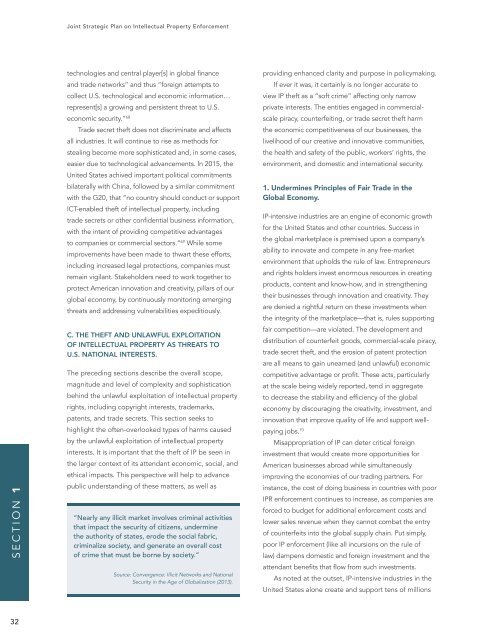ENFORCEMENT
eop_ipec_jointstrategicplan_hi-res
eop_ipec_jointstrategicplan_hi-res
You also want an ePaper? Increase the reach of your titles
YUMPU automatically turns print PDFs into web optimized ePapers that Google loves.
Joint Strategic Plan on Intellectual Property Enforcement<br />
SECTION 1<br />
technologies and central player[s] in global finance<br />
and trade networks” and thus “foreign attempts to<br />
collect U.S. technological and economic information…<br />
represent[s] a growing and persistent threat to U.S.<br />
economic security.” 68<br />
Trade secret theft does not discriminate and affects<br />
all industries. It will continue to rise as methods for<br />
stealing become more sophisticated and, in some cases,<br />
easier due to technological advancements. In 2015, the<br />
United States achived important political commitments<br />
bilaterally with China, followed by a similar commitment<br />
with the G20, that “no country should conduct or support<br />
ICT-enabled theft of intellectual property, including<br />
trade secrets or other confidential business information,<br />
with the intent of providing competitive advantages<br />
to companies or commercial sectors.” 69 While some<br />
improvements have been made to thwart these efforts,<br />
including increased legal protections, companies must<br />
remain vigilant. Stakeholders need to work together to<br />
protect American innovation and creativity, pillars of our<br />
global economy, by continuously monitoring emerging<br />
threats and addressing vulnerabilities expeditiously.<br />
C. THE THEFT AND UNLAWFUL EXPLOITATION<br />
OF INTELLECTUAL PROPERTY AS THREATS TO<br />
U.S. NATIONAL INTERESTS.<br />
The preceding sections describe the overall scope,<br />
magnitude and level of complexity and sophistication<br />
behind the unlawful exploitation of intellectual property<br />
rights, including copyright interests, trademarks,<br />
patents, and trade secrets. This section seeks to<br />
highlight the often-overlooked types of harms caused<br />
by the unlawful exploitation of intellectual property<br />
interests. It is important that the theft of IP be seen in<br />
the larger context of its attendant economic, social, and<br />
ethical impacts. This perspective will help to advance<br />
public understanding of these matters, as well as<br />
“Nearly any illicit market involves criminal activities<br />
that impact the security of citizens, undermine<br />
the authority of states, erode the social fabric,<br />
criminalize society, and generate an overall cost<br />
of crime that must be borne by society.”<br />
Source: Convergence: Illicit Networks and National<br />
Security in the Age of Globalization (2013).<br />
providing enhanced clarity and purpose in policymaking.<br />
If ever it was, it certainly is no longer accurate to<br />
view IP theft as a “soft crime” affecting only narrow<br />
private interests. The entities engaged in commercialscale<br />
piracy, counterfeiting, or trade secret theft harm<br />
the economic competitiveness of our businesses, the<br />
livelihood of our creative and innovative communities,<br />
the health and safety of the public, workers’ rights, the<br />
environment, and domestic and international security.<br />
1. Undermines Principles of Fair Trade in the<br />
Global Economy.<br />
IP-intensive industries are an engine of economic growth<br />
for the United States and other countries. Success in<br />
the global marketplace is premised upon a company’s<br />
ability to innovate and compete in any free-market<br />
environment that upholds the rule of law. Entrepreneurs<br />
and rights holders invest enormous resources in creating<br />
products, content and know-how, and in strengthening<br />
their businesses through innovation and creativity. They<br />
are denied a rightful return on these investments when<br />
the integrity of the marketplace—that is, rules supporting<br />
fair competition—are violated. The development and<br />
distribution of counterfeit goods, commercial-scale piracy,<br />
trade secret theft, and the erosion of patent protection<br />
are all means to gain unearned (and unlawful) economic<br />
competitive advantage or profit. These acts, particularly<br />
at the scale being widely reported, tend in aggregate<br />
to decrease the stability and efficiency of the global<br />
economy by discouraging the creativity, investment, and<br />
innovation that improve quality of life and support wellpaying<br />
jobs. 70<br />
Misappropriation of IP can deter critical foreign<br />
investment that would create more opportunities for<br />
American businesses abroad while simultaneously<br />
improving the economies of our trading partners. For<br />
instance, the cost of doing business in countries with poor<br />
IPR enforcement continues to increase, as companies are<br />
forced to budget for additional enforcement costs and<br />
lower sales revenue when they cannot combat the entry<br />
of counterfeits into the global supply chain. Put simply,<br />
poor IP enforcement (like all incursions on the rule of<br />
law) dampens domestic and foreign investment and the<br />
attendant benefits that flow from such investments.<br />
As noted at the outset, IP-intensive industries in the<br />
United States alone create and support tens of millions<br />
32


